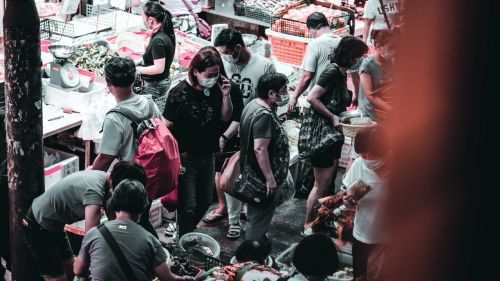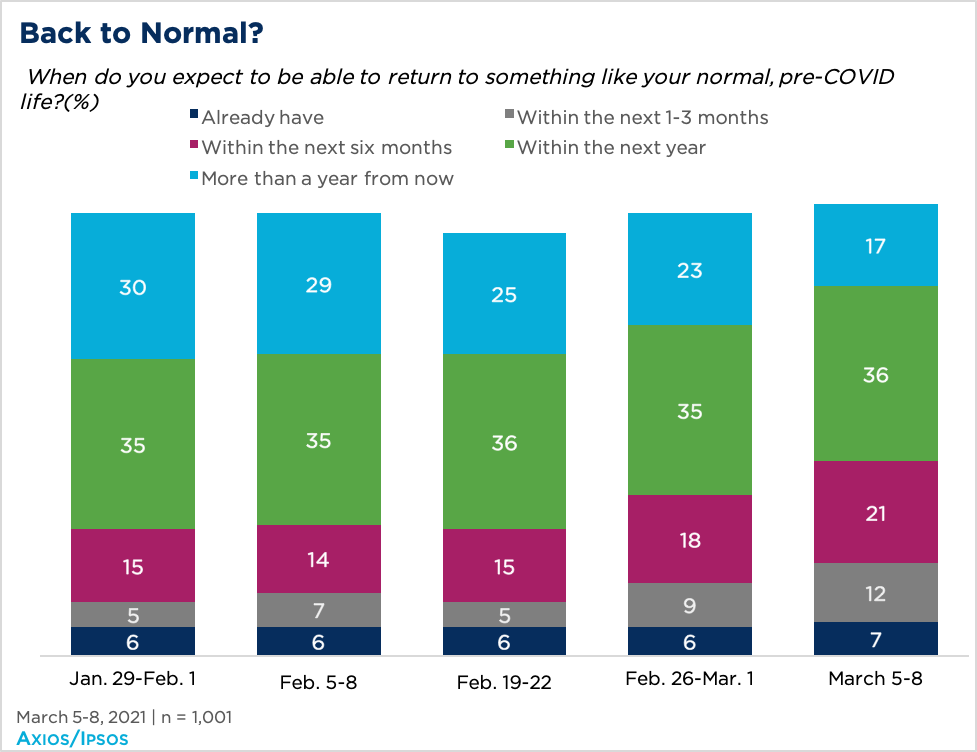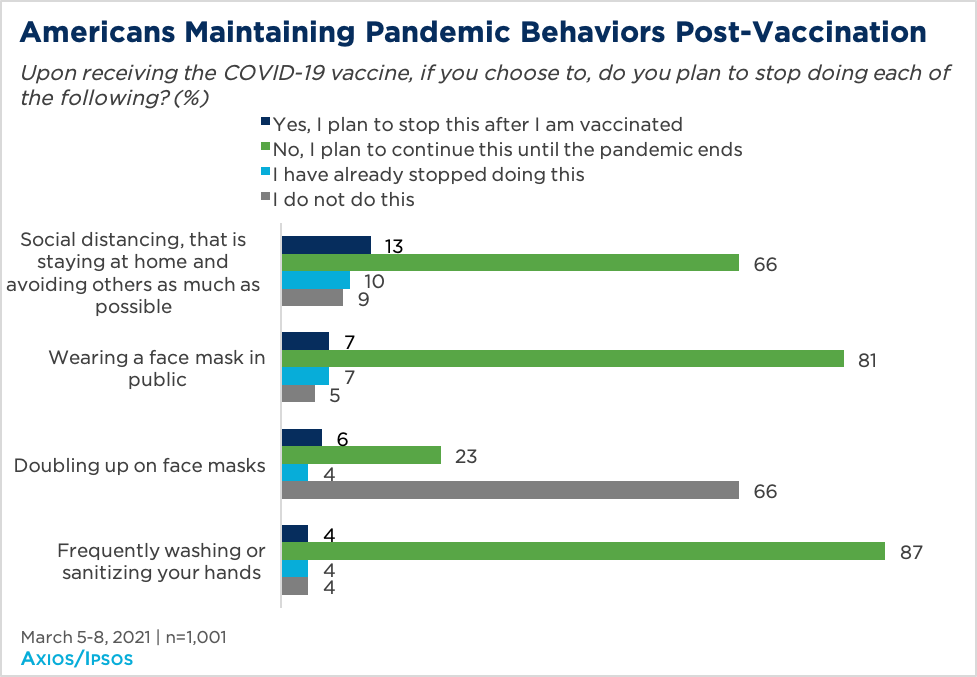As Virus Spreads Unevenly, Global Public Opinion Shows Mixed Feelings

While some countries are beginning to see a light at the end of the tunnel, others continue to struggle through the crisis as case numbers remain elevated.
This week the world passed the 120.7 million case mark, with over 2.6 million deaths attributed to COVID-19. As the virus ebbs in some countries, others like Brazil see rising case numbers and deaths. Meanwhile, a suspension of the AstraZeneca vaccine in Europe threatens to impact public confidence in vaccines.
For this week’s COVID-19 update, the Chicago Council Survey team looks at polling results from the United States, Japan, South Korea, France, the United Kingdom, India, and Brazil.
Key Findings
- As France suspends the AstraZeneca vaccine pending a review by the European Medicines Agency, slightly more than half of French people (54%) intend to be vaccinated.
- While pluralities of Britons say that several top officials have handled the pandemic poorly, slightly more Britons (43%) say the economy will improve over the next year than say it will worsen (41%).
- Brazil’s vaccination rollout has been extremely slow, despite it’s robust public health system, and many blame President Bolsonaro (52%) for the lagging campaign.
- Six in ten Americans (63%) expect the coronavirus outbreak to get better than it is now, and majorities are optimistic about the reopening of schools (70%) and businesses (74%) and the ongoing vaccination campaign (77%).
- Two-thirds of Japanese (66%) say they want a vaccine, though only a quarter (23%) believe that the public vaccination campaign will proceed as scheduled.
- Among one of the largest populations in the world, nearly two-thirds of Indians (64%) intend to be vaccinated.
The United States
29.57 million cases, 536,472 deaths
This past Wednesday, March 11, was observed by many in the United States as a one-year anniversary of the pandemic. Though COVID-19 cases had appeared in the US prior to then, the night of March 11 was seen as a watershed moment, with a series of events happening within 30 minutes that brought the reality of the COVID-19 pandemic home to everyday Americans: President Trump banned travel from Europe, Tom Hanks announced he had tested positive for the coronavirus, and the NBA suspended its season.
A year later, Americans are feeling more optimistic: six in ten (63%) say they expect the coronavirus outbreak to get better than it is now, according to recent CBS News/YouGov polling. And majorities say they are optimistic about vaccinations (77%), the reopening of schools (70%) and businesses (74%), and both the national (58%) and local (65%) economy.
Normality seems closer than it’s been in a long time. Axios/Ipsos polling from March 5-8 finds that while Americans still see returning to a normal life as risky, they’re less concerned about it each passing week. Now, six in ten Americans (61%) say that returning to their normal pre-coronavirus life right now is a large or moderate risk, down from 71 percent who said the same at the end of January. Most Americans (76%) are anticipating a return to normal life within a year, and a rising share expect a return to normal in the next six months (40%, up from 26% in mid-February).

Though vaccination rates are rising across the country, many health restrictions remain in place, and the Center for Disease Control continues to recommend that Americans wear masks and avoid crowds. The public seems to be paying attention: Axios/Ipsos polling finds that Americans are not planning to relax their pandemic behaviors post-vaccination. Majorities of Americans say they plan to continue social distancing (66%), wearing a mask in public (81%), and washing their hands frequently (87%) until the pandemic ends.
Though these measures were new to Americans at the outset of the pandemic, the habits are by now well-ingrained. And CBS/YouGov finds that most Americans (64%) say they will be patient about anti-pandemic measures until the outbreak ends, though three in ten Americans say they are frustrated by them (31%).

A major concern among health officials remains vaccine hesitancy. Early surveys showing greater rates of vaccine hesitancy among minority communities, which have also seen greater rates of death and hospitalization of the pandemic, alarmed public health officials. The resulting efforts to reach out to these hard-hit communities may be paying off: the latest NPR/PBS/Marist poll, fielded March 3-8, finds similar rates of vaccine enthusiasm among racial and ethnic groups. Majorities of white (70%), Black (73%), and Latino Americans (63%) all say they either have gotten or plan to get a coronavirus vaccine. Instead, the greatest predictor of vaccine hesitancy is a combination of partisanship and gender: half of Republican men (49%) say they do not plan to get a COVID-19 vaccine. By comparison, only six percent of Democratic men say the same.
Japan
448,688 cases, 8,622 deaths
The theme of today’s Japan update: mixed news.
The state of emergency currently in place in Tokyo and three neighboring prefectures is set to lift on March 21, confirmed today by Prime Minister Suga. The timing is awkward, as Tokyo announced in the same day a new monthly high number of COVID-19 cases. It may also not be the most popular move. Per a TBS News/JNN poll fielded March 6-7, two-thirds of Japanese (66%) don’t think it should be lifted. And the public overall remains quite concerned about the pandemic: a March 3-5 NHK poll finds the Japanese public remains quite concerned about the spread of the coronavirus, with most saying they are either very (33%) or somewhat (47%) worried about getting infected. At the same time, it’s unclear how effective the more limited second state of emergency has been in limiting the spread of the coronavirus. The end of the state of emergency also coincides with the beginning of cherry blossom season, though many of the festivals have been canceled and many parks in Tokyo are not allowing the usual flower-viewing picnics (hanami) so popular this time of year.
Prime Minister Yoshihide Suga is among those getting mixed reviews from the public. Polling from Yomiuri Shimbun (fielded March 5-7) finds Suga’s approval rating at 48 percent, up from 39 percent last month, though disapprovals also remain high (42%, similar to last month’s 44%). With other polls showing a similarly close divide on Suga, it’s some good news for the prime minister. However, he’s hardly recovered to the high sky-high popularity he saw at the beginning of his term in September 2020. And despite this recovery in the polls, Suga will have competition for the Prime Minister position come the fall. Indeed, Yomiuri polling finds that only three percent pick Suga out of a list of LDP contenders in the coming October election. While no potential candidate has a majority, a plurality (26%) favor Taro Kono. who formerly held the posts of defense minister and foreign minister and is currently heading up Japan’s vaccination campaign.
The vaccination campaign, too, gets mixed news from the latest public polling. Thus far, over 350,000 doses have been administered with the initial wave focused on healthcare workers. A TBS News/JNN poll fielded March 6-7 shows that two-thirds of Japanese (66%) say they want a vaccine, up six points from last month. But the public is skeptical that the vaccine rollout will go smoothly. Only a quarter (23%) believe that the public vaccination campaign, starting with those over 65 on April 12, will go on as scheduled. And as in other countries, different questions about vaccination reveal varying levels of hesitancy. A March 5-7 NTV poll finds that while 18 percent of Japanese want to get vaccinated immediately, most (65%) say they want to get vaccinated, but not urgently (and only 15 percent say they do not want a vaccine outright). Minister Kono has his work cut out for him.
Rounding out the list of those receiving a mixed message from the public: the Tokyo Olympic and Paralympic Games. The Olympic torch relay will start on March 25 in Fukushima prefecture, with strict rules for spectators as the torch traverses the entirety of Japan. But whether there will be spectators at the Games themselves remains unclear. Per NHK polling, the public is narrowly supportive of holding the games, with support up slightly from last month, though with little agreement on how they should be held. A third (34%) support holding the Games with a limited number of spectators, while 19 percent say there should be no spectators at all (and five percent support a fully normal Games). On the other side, a third (33%) say they should be canceled.
South Korea
96,849 cases, 1,686 deaths
South Korea reported 363 new cases on March 16, and has administered 546,277 COVID-19 doses. With the number of new cases hovering at about 400 each day over the past week, the government remains cautious on a quick return to normal life, and strict social distancing measures remain in place. These measures include inspections of public areas such as shopping malls, private tutoring academics, and public baths and prohibit gatherings of more than four people. South Korea plans to extend these social distancing measures for another two weeks.
In a controversial new policy turn, several provinces in Korea—including Seoul—are now requiring all non-Koreans to take a COVID-19 test by the end of March. Failure to do so will result in a fine of roughly $2,700. The order comes in the wake of several outbreaks at factories that employ large numbers of foreign workers.
The mandate has created confusion and anger among the foreign population. In Gyoenggi province, the government has been criticized for ineffective communication and long waiting lines at testing centers. It has also led to accusations of racism and xenophobia, but locals are satisfied with the new order claiming that they feel safer in their community.
France
4.1 million cases, 91,170 deaths
On Monday, March 15, President Emmanuel Macron announced that France would suspend the use of the AstraZeneca vaccine, citing certain dangerous side effects including blood clots. This follows identical moves by Germany, Italy, and several other countries while waiting to hear the opinion of the European Medicines Agency before re-authorizing the vaccine. Although a majority of French people (54%) intend to be vaccinated, according to an Elabe survey of 1,003 French adults conducted March 3-4, news of potential dangers arising from one of the vaccines may prompt some French people to reassess.
Even as Macron suspends the vaccine, few French people say that he has handled the pandemic well since it started in a March 10-11 Odoxa survey of 1,005 French adults. Just 37 percent say he has been up to the situation while nearly two-thirds (63%) say he has not. However, this is a higher approval than French people give to health minister Olivier Véran (35%), Prime Minister Jean Castex (34%), the government as a whole (30%), or the political opposition parties (15%). However, the French public is significantly more likely to say that mayors (73%) and businesses (68%) have been up to the situation since the beginning of the pandemic.
In regard to specific actions that Macron’s government has taken against the coronavirus, French people are split on whether they were satisfactory or not. A slight majority (52%) says that the wearing of protective masks was satisfactory, though only slightly fewer (48%) say it was not. French people are similarly split on how acceptable the government’s actions were regarding the protection of the French economy (49%), the welcoming of students in scholarly establishments (47%), and the protection of French people’s health (43%). Regarding the conditions for opening or closing of public places (33%) and the national vaccination strategy (25%), even fewer French people describe the government’s actions as satisfactory.
France vaccine rollout remains slow and lags behind other nations like the United Kingdom and the United States. However, France is in line with many other European nations, and it’s unclear what the recent decision to suspend the AstraZeneca vaccine will mean for the public’s intention to be vaccinated.
The United Kingdom
4.2 million cases, 125,690 deaths
In the United Kingdom, cases and deaths have returned to levels similar to before the large waves in the fall and winter. However, as certain leaders call for a public inquiry into the UK government’s handling of the coronavirus pandemic, the grim toll of the past year appears to be overshadowing the improvements of the last two months. An Ipsos MORI poll conducted March 5-12 showed that pluralities of Britons say that Prime Minister Boris Johnson (46%), the government (44%), and health minister Matt Hancock (42%) have handled the pandemic very or fairly poorly.
Despite poor views of the government’s actions during the pandemic, a sense of optimism has emerged regarding the economy. Ipsos polling shows that for the first time since 2016, more Britons say that the economic situation of the UK will improve over the next 12 months (43%) than say it will worsen (41%). This a stark change from the grim outlook that characterized British public opinion in earlier stages of the pandemic.
One official who has fared well is the Chancellor of the Exchequer Rishi Sunak, whom Britons say has handled the pandemic very or fairly well (55%). Positive views of Sunak are likely driven by his economic support schemes which have provided support to British people and the restaurant industry, though some have blamed his ‘eat out to help out’ program for clusters of infections over the summer. Regardless, Sunak has announced several more economic support plans which would provide further aid for workers, help local pubs, and provide free training for small businesses, among other programs.
Brazil
11.6 million cases, 282,127 deaths
Brazil is experiencing its worst outbreak of COVID-19 to date. Over the past week, the country set a new record with 12,818 new deaths, which surpasses even the number of the United States, the only country that has a larger total death count than Brazil. The large number of patients in Brazil is pushing hospitals to their limits—as of March 14, 21 Brazilian states and the Federal District had an ICU occupancy rate of over 80 percent.
Meanwhile, despite having robust public health infrastructure and a distinguished record of disease control, Brazil seems to be falling behind on COVID-19 vaccination. So far, only 1.4% of the population has been fully vaccinated, according to figures from Johns Hopkins University. President Jair Bolsonaro, who for a long time dismissed the seriousness of the pandemic, has been blamed by critics and medical experts for the slow rollout of vaccination. The Bolsonaro administration not only rejected three separate offers from Pfizer to deliver vaccines to Brazil, but also delayed funding for Brazilian research centers who partnered with vaccine manufacturers to produce supplies of their vaccines in Brazil.
The Brazilian government’s incompetency at handling the pandemic appears to be taking a toll on its popularity. According to a CNT survey of 2,002 people conducted February 18-20, 2021, the approval rate for the Bolsonaro administration is 32.9 percent, compared to 41.2 percent in October, 2020. A EXAME / IDEIA survey of 1,200 people conducted March 8-11 shows that the approval rate for the Bolsonaro government is 28 percent, one of the lowest points in the last two years. When asked who is to blame for the slow rollout of vaccination in Brazil, more than half (52%) answered Bolsonaro, compared with two in ten (19%) who answered their governor and a quarter (26%) who said they did not know.
India
11.4 million cases, 159,044 deaths
India recorded its highest single-day spike of the year on Monday, with 26,291 new infections as a resurgence of the virus continues. While over half of new cases were reported in the western state of Maharashtra, Dr. Srinath Reddy, president of the Public Health Foundation of India, attributes the increase to a greater apathy towards observing health precautions across the country. Part of this apathy is due to optimism surrounding India’s vaccination effort as well as the lower levels of new cases the country saw early in the year.
After launching its vaccination drive on January 16, just over 30 million people in India have now received at least one dose of the vaccine. The government intends to cover 250 million “priority people” by the end of July, which gives the country about 150 days to achieve its goal. Although concerns still exist over the safety of the vaccine, the most recent survey data indicates that a majority of Indians (64%) will take the vaccine or have already done so, according to a February 15 YouGov poll.
Beyond the rise in cases and vaccination efforts, Indians, like the rest of the world, are grappling with the ongoing economic and social effects of the pandemic. Despite the immense challenges India’s 1.36 billion people face, the country ranked among the highest in the world in community support surrounding COVID-19. According to a “Global Perceptions” report by Ipsos in February, a slight majority of Indians (55%) stated that their local community has become more supportive over the last six months. When compared to its Asian contemporaries such as Malaysia (43%), Singapore (39%), South Korea (26%), and Japan (10%), India stands out in its commitment to supporting others in its local communities.
Additionally, a large majority of urban Indians (73%) said they felt supported by their employer during the pandemic, placing it at the top of the 28 countries surveyed by Ipsos in March. Only 1 in 2 global citizens (47%) said they were supported by their employers.





